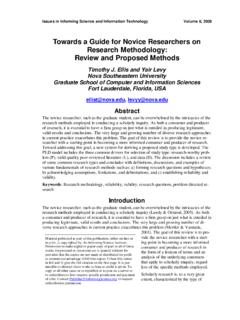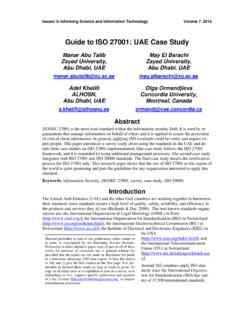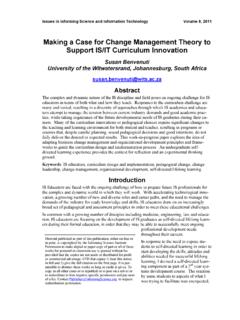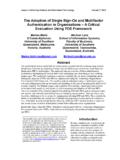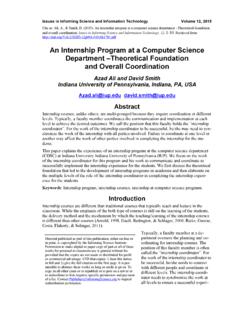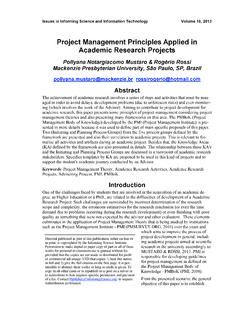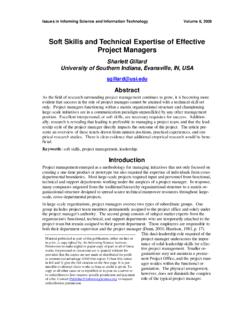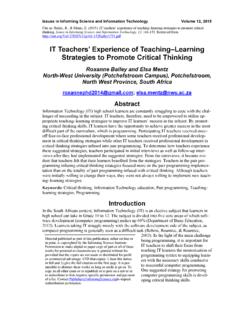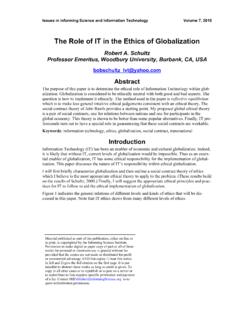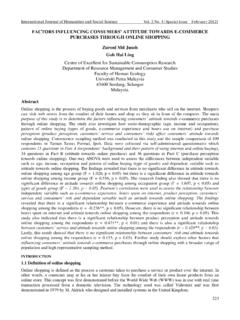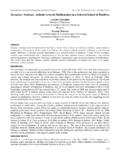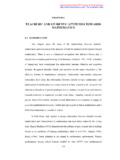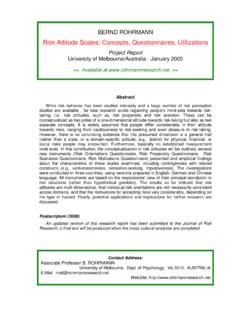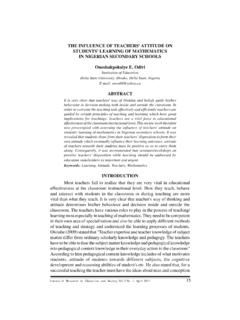Transcription of Analysis of Student Attitudes towards E-learning: The Case ...
1 Issues in Informing Science and Information Technology Volume 11, 2014. Cite as: Rhema, A., & Miliszewska, I. (2014). Analysis of Student Attitudes towards e-learning: The case of engineering students in Libya. Issues in Informing Science and Information Technology, 11, 169-190. Retrieved from Analysis of Student Attitudes towards E-learning: The Case of Engineering Students in Libya Amal Rhema and Iwona Miliszewska Victoria University, Melbourne, Victoria, Australia Abstract Student Attitudes and beliefs towards e-learning, as well as their satisfaction with technology and past e-learning experiences are regarded as success determinants of future e-learning initiatives. While e-learning and its potential benefits for developing countries have been discussed in the literature, research on user perspectives of e-learning in those countries is limited. This article presents findings on the experiences and perceptions of technology-supported learning gathered from engineering students at two Libyan universities.
2 An Analysis of relationships between stu- dent Attitudes towards e-learning and their demographic characteristics, access to technology, use of technology for learning, skill in technology, and satisfaction with technology is also included. The reported findings might be of interest to academics, administrators, and decision-makers in- volved in planning, developing and implementation of future e-learning strategies in Libya and similar developing countries. Keywords: developing country, e-learning, engineering students, information and communica- tion technology (ICT), Libya, Student Attitudes , technology-supported learning. Introduction Many scholars agree that ICTs play an increasingly important role in facilitating the educational processes and systems of today (AL-Hunaiyyan, Al-Huwail, & Al-Sharhan, 2008; Oh & Park, 2009; Vaughan & Garrison, 2006). E-learning has started to emerge in many developing coun- tries where it has the potential to help meet an increasing demand for education and address the growing decline of trained teachers (UNESCO, 2006).
3 The application of e-learning in develop- ing countries has gradually advanced in recent years with an improved availability of Internet connections, local area networks, and IT support (Omidinia, Masrom, & Selamat, 2011; Tedre, Ngubuke, & Kempainnen, 2010; Williams, Mayer, & Minges, 2011). However, other challenges still prevail. In those countries, the active, participative Student who is required for interactive learning is rare, and the traditional methods are widely used in teaching and learning (Andersson & Gr nlund, 2009; Eastmond, 2000;. Material published as part of this publication, either on-line or Evans, 2005; Sehrt, 2003). In addition, in print, is copyrighted by the Informing Science Institute. Permission to make digital or paper copy of part or all of these the developing countries often lack the works for personal or classroom use is granted without fee ability to implement advanced educa- provided that the copies are not made or distributed for profit tional practices on their own (Andersson or commercial advantage AND that copies 1) bear this notice & Gr nlund, 2009).
4 In full and 2) give the full citation on the first page. It is per- missible to abstract these works so long as credit is given. To Student characteristics are regarded as a copy in all other cases or to republish or to post on a server or critical success factor in e-learning in to redistribute to lists requires specific permission and payment developing countries (Bhuasiri, Xay- of a fee. Contact to request redistribution permission. moungkhoun, Zo, Rho, & Ciganek, Analysis of Student Attitudes towards E-learning 2012). These characteristics include computer self-efficacy, Internet self-efficacy, computer ex- perience, Internet experience, computer anxiety, and Attitudes toward e-learning (Chu & Chu, 2010; Chiu & Wang, 2008; Fuller et al., 2006; Pituch & Lee, 2006; Shih, Mu oz, & Sanchez, 2006; Sun et al., 2008). Student Attitudes are influenced by the quality and perceived ease of use of e-learning courses, functionality of e-learning platforms, and the level of Student computer skills (Aixia 2011).
5 Their computer experience including perceived self-efficacy, en- joyment, and usefulness of using e-learning also plays a role (Liaw & Huang, 2011). In turn, posi- tive Student Attitudes and behaviors towards e-learning are critical to their e-learning readiness and acceptance (Lim, Hong, & Tan, 2008; Selim, 2007). To inform the prospects of future e-learning initiatives in Libya, a study involving Libyan under- graduate engineering students was conducted in 2011-2013; the study examined the students' ex- periences and perceptions of e-learning to gauge their acceptance of, and preparedness for, e- learning. Statistical Analysis was conducted to assess Student Attitudes towards e-learning, and to reveal the relationships between their Attitudes and their demographic characteristics, access to technology, use of technology for learning, skill in technology, and satisfaction with technology. This paper presents an overview of Student Attitudes towards ICT and e-learning, it outlines the factors influencing those Attitudes , and it discusses the findings of the study.
6 Related Literature Student Attitudes towards ICT and E-learning in Developing Countries Research undertaken in the area of attitude and attitude formation shows that Attitudes and beliefs are linked, and Attitudes and behaviors are linked; moreover, Attitudes are essentially divided into likes and dislikes (Siragusa & Dixon, 2008). With the broad expansion of ICT in education dur- ing the last decade, many research studies have explored the Attitudes of users (educators and stu- dents) towards the integration of ICT in education (Gasaymeh, 2009; Mishra & Panda, 2007;. Wen & Shih, 2008). University students in developing countries have varying Attitudes towards e-learning but gener- ally their Attitudes are positive (El-Gamal & El-Aziz, 2011). This was emphasised by Nassoura (2012) who pointed out that many students had positive Attitudes towards e-learning because it had a positive impact on their motivation as well as self-esteem. In some developing countries, the learning process and the adherence to traditional practices are inseparable.
7 Thus, technology-based tools for e-learning are viewed as an interference with the practices that have been valued for generations. A good example of this scenario is Botswana. According to Brown, Thomas, van der Merwe and van Dyk (2008), the socio-cultural environ- ment in Botswana is very strong. Students in Botswana's higher learning institutions are still so strongly embedded in it that their attitude towards e-learning reflects it. Despite having taken sig- nificant steps towards a Western-style economy and towards urbanisation, the country maintains strong connections to its traditional roots. According to Brown and colleagues (2008), students gain most of their knowledge from their integration with the various communities that have strong values, knowledge and beliefs. However, the reserved attitude towards technology-based learning tools in Botswana and other developing countries is gradually disappearing, as the obvious usefulness of these tools is being realised.
8 As Internet-enabled mobile devices are becoming more and more popular in developing countries, so is the range of areas in which they are applied; and this includes e-learning. Mobile devices such as Internet-enabled phones are very popular and are increasingly being used for blogging and social networking; this, in turn, helps improve user Attitudes towards e-learning. 170. Rhema & Miliszewska According to Deb (2011) however, the physical separation between the learner and the instructor tends to create a feeling of isolation on the part of the learner leading to negative Attitudes . A 2002 survey carried out in Pakistan's Virtual University with 387 undergraduate students in their final year of study concluded that over 90% of the students viewed learning through satellite TV and the Internet as advantageous, and Student attitude towards e-learning were generally posi- tive (Hussain, 2007). Omidinia, Masrom and Selamat (2011) identified Student Attitudes as a fac- tor that determined how e-learning was adopted in Iran.
9 Selim (2007) stated users who were very familiar with web technologies and the skills needed to use computer and mobile devices for in- struction developed positive Attitudes . On the other hand, students who were not skilled in ICT. became anxious about the use of computers, had lower expectations from educational technology, and they did not believe in the benefits of e-learning (Vrana, Garyfallos, Zafiropoulos, & Pascha- loudis, ). Factors Influencing Student Attitude towards ICT and E-learning Student Attitudes towards e-learning have been identified as critical to the success of e-learning (Zhang & Bhattacharyya, 2008). Bhuasiri, Xaymoungkhoun, Zo, Rho and Ciganek (2012) found that in developing countries the most significant factors were related to increasing technology awareness and improving attitude toward e-learning, enhancing basic technology knowledge and skills, improving learning content, requiring computer training, motivating users to utilise e- learning systems, and requiring a high level of support from the university.
10 In addition, attributes used to assess the Attitudes towards ICT of students, teachers and principals have been catego- rised in two groups: demographics (age and gender) and computer experience (training, years of using computer, ownership of computer, access to a computer, intensity of computer use) (Jimoy- iannis & Komis, 2007; Papaioannou & Charalambous, 2011; Wen & Shih, 2008). Demographic Characteristics Literature shows that gender plays a key role in understanding the differences in perceptions of the usefulness of technology and Attitudes and perceptions of e-learning; various studies have been undertaken to investigate the effect of gender, as well as age, and year of study on Student Attitudes (Bertea, 2009; Cheng, 2006; Paris, 2004; Roca, Chiu, & Martinez, 2006). Several studies revealed that male students had more positive Attitudes towards e-learning than female students (Liaw & Huang, 2011; Papaioannou & Charalambous, 2011; Whitley, 1996). In contrast to this, Egbo and colleagues (2011) concluded that female students tended to accept the use of ICT more than their male counterparts.
